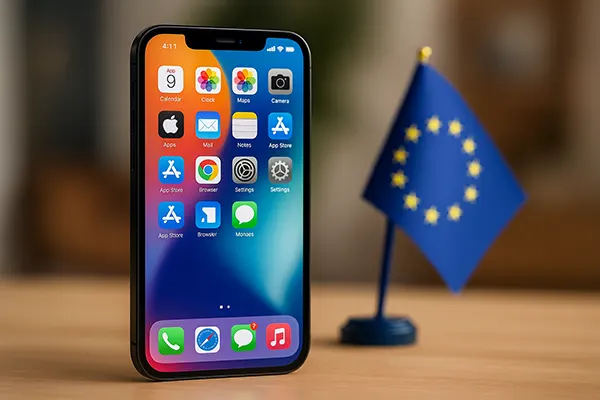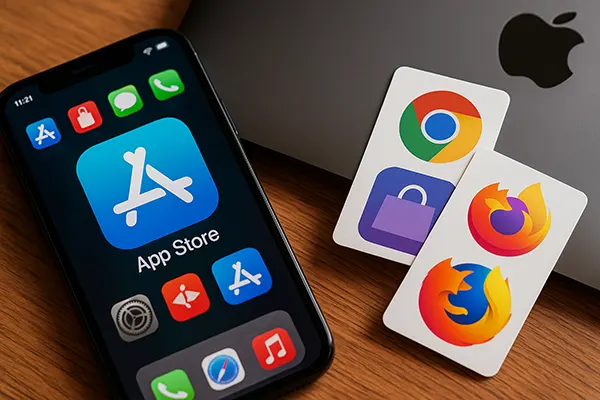What Will Change for iPhone Users After the DMA Adoption in the EU

The Digital Markets Act (DMA), adopted by the European Union, represents a major shift in the regulation of digital services. It directly affects dominant tech companies, including Apple, by enforcing openness, competition, and user choice. For iPhone users, this means significant changes in how apps are installed, what browsers can be used, and how Apple manages its services and security restrictions.
Alternative App Stores: A New Era for iOS
One of the most significant outcomes of the DMA for iPhone users is the possibility to install applications from alternative stores, not just the App Store. From March 2024, Apple was obliged to allow sideloading and third-party app marketplaces on iOS devices within the EU. Users now have the option to download apps from independent stores, provided those stores meet Apple’s minimal security and transparency criteria.
These changes enable developers to bypass the 15–30% commission Apple previously charged, making app distribution potentially more affordable and flexible. For consumers, this means access to a broader variety of apps, including ones that may have been previously rejected by Apple due to its strict guidelines.
However, Apple has introduced a “Core Technology Fee” of €0.50 per user per year for apps distributed outside its own store if they surpass 1 million annual installs, a move that has drawn criticism from developers and regulators alike.
Implications for Developers and Consumers
Developers now face a strategic choice: continue operating within Apple’s framework or migrate to alternative stores. While the financial benefits may be compelling, developers must weigh these against potential security risks and user trust. Apple continues to enforce notarisation requirements even for apps installed from external sources.
For consumers, the ability to choose how to install apps enhances freedom, but also introduces a new responsibility to evaluate the trustworthiness of external sources. It is now more important than ever to ensure downloads come from legitimate developers and verified stores.
This regulatory shift promotes fairer market dynamics, but its long-term impact on security and app quality remains to be seen as the ecosystem adapts.
Browser Freedom: No More WebKit Monopoly
Prior to the DMA, all web browsers on iOS were required to use Apple’s WebKit engine. This meant that even Chrome, Firefox, or Edge were technically Safari under the hood. With the DMA in effect, this rule has been abolished within the EU, allowing developers to use their own engines on iOS.
This change unlocks true browser diversity on iPhones for the first time. Users can expect real performance and feature differentiation between browsers, potentially boosting innovation and improving web experiences across the board.
Apple still retains some control. For example, developers must declare which engine is used and meet certain privacy standards. But these conditions are far less restrictive than before and align more closely with practices on Android and desktop systems.
Impact on Privacy and Security
While the DMA opens the door for browser competition, it also raises concerns about user data protection. Apple’s integration of Safari with its security and privacy features, such as Intelligent Tracking Prevention, will no longer be guaranteed if users switch to third-party engines.
Developers of competing browsers will need to build or integrate their own privacy safeguards, creating a more fragmented privacy landscape. Users must stay informed and selective about which browsers they choose to use.
Nonetheless, the presence of real competition could incentivise all browser providers to improve user control, privacy features, and performance.

Limitations on Apple’s Control: Transparency and Interoperability
Beyond app stores and browsers, the DMA imposes broader requirements on Apple, including increased transparency about system functions and APIs. Apple must provide access to features such as NFC, camera, and Find My network to third-party apps and accessories.
This aims to break down the so-called “walled garden” that critics say Apple built, locking users into its ecosystem. Developers now gain more tools to create competing services, while users benefit from more choices for payment systems, wallets, and even device management tools.
Furthermore, the DMA mandates that users must be able to uninstall pre-installed apps and change default settings more freely. Apple has complied with these by adding new settings in iOS 17.4, offering clearer control over defaults for web browsers, email apps, and music players.
What Remains Exclusive to Apple
Despite the DMA’s enforcement, Apple retains the ability to enforce certain safeguards. For example, full access to iMessage APIs and Facetime remains restricted, as Apple argues these services do not meet the EU’s threshold of being gatekeeper “core platform services”.
There are also ongoing legal discussions regarding Apple’s compliance. The European Commission has warned Apple that some of its fees and approval procedures may still violate the spirit of the DMA, and further regulatory actions may follow.
As of June 2025, Apple’s changes are under scrutiny, and the long-term legal and technical outcomes are still evolving. However, the direction is clear: less control for Apple and more freedom for developers and users within the EU.
